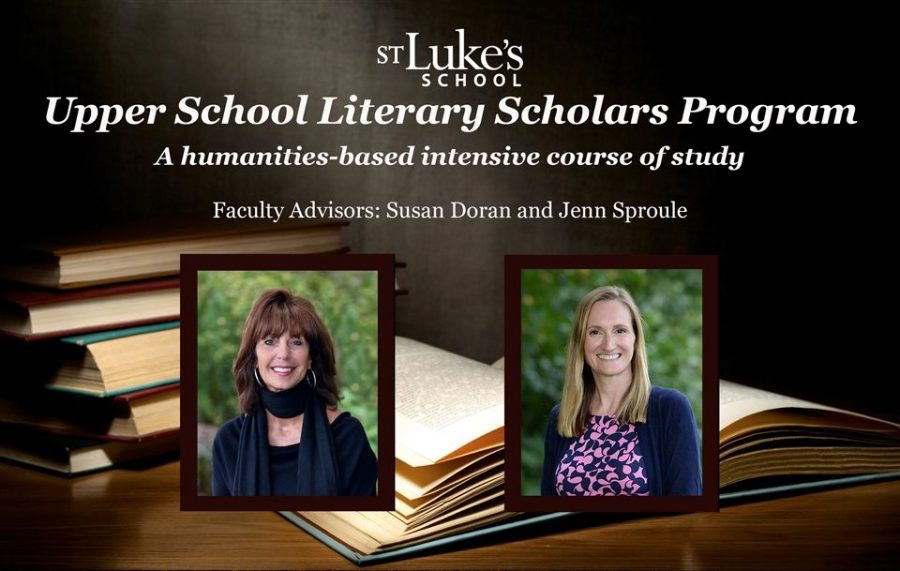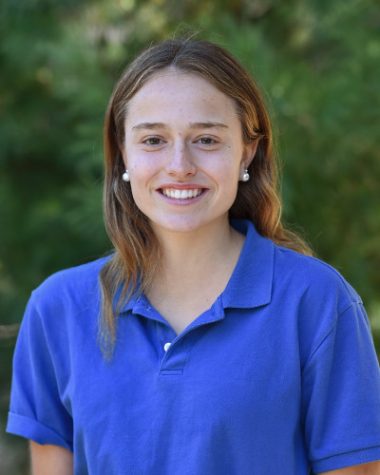SLS Introduces New Literary Scholars Program
January 25, 2021
Perhaps you have heard of the St. Luke’s Scholars program, which offers high-achieving and highly-motivated seniors the opportunity to embark on independent research in a particular field of interest. For years, the options for study have been Classical, Global, and STEM (Science, Technology, Engineering, & Mathematics). Starting February 21, there is a new option in the mix for students who love literature. I sat down with Ms. Sproule and Ms. Doran, the program advisors, to learn what the new Literary Scholars program will entail.
Responses have been edited slightly for clarity.
St. Luke’s hasn’t had a new Scholars program in a decade. Why did you want to start this program, and why is it meaningful at this moment in particular?
Ms. Sproule: The pandemic and all the history we have lived through in the last year really reminded people how important the humanities are. The fact that Amanda Gorman’s poetry reading [at President Biden’s inauguration] truly caught the world by storm is amazing. It felt like my friends were celebrating and talking about her words more than anything, which I thought was such a testament to the power of language. I think now, more than ever, we need to be reminded of that. When I first arrived, to be honest, I was surprised that there wasn’t a Literary Scholars program after I heard about the other opportunities for seniors. Literary Scholars offers students who are interested in humanities a great opportunity to dive deeper into literature, and it is something I would have loved when I was a student. I felt like there was a gap that needed to be filled, and I am really excited to fill it. I’m looking forward to partnering with some students who I had the pleasure of teaching before in a new and exciting way and really challenging them to do work at the collegiate level.
Ms. Doran: The humanities teach us what it means to be human and how to negotiate the world with compassion, honor, creativity, and joy. This Literary Scholars program is an opportunity for a student with an open-intellect and a happy heart to truly look at the scope of what the humanities can do. Because Literary Scholars is interdisciplinary, a student can explore the nature of evil in Shakespeare and 21st century politics; connect the fantasy world of The Hobbit with Harry Potter; uncover the music in poetry and song of the Black women in America; unwrap Victorian England with the fire of the Brontë sisters who became legends without leaving a parsonage.
What type of students would Literary Scholars appeal to?
Ms. Sproule: Certainly avid readers; they will be taking deep literary dives, so it’s important that they have a passion for literature and interest in other areas of humanities. Since it will be a literary-based project with an interdisciplinary element, it would be important to come to the Scholars program with an openness to incorporate music, history, language, or art.
What kind of projects can students do?
Ms. Sproule: It’s really exciting to think about the options. You can take something that you have already read in school and take a deeper dive into it: the poetry of Emily Dickinson in conversation with the music of Taylor Swift, for example. One thing a lot of students might not be familiar with is literary criticism. It’s a way to analyze literature from a particular perspective. One of the aspects of this project that I think will be really exciting is learning what these critical lenses are and how to apply them. With Emily Dickinson and Taylor Swift, you can apply a feminist lens and sort of ask yourself, “How do the works and lives of Dickinson and Swift define and reflect the feminine or feminist ideal?” Another option might be taking a classic dystopian novel like 1984 and learning about the historical context that inspired the novel, even perhaps putting it into conversation with the current political environment, and taking a cultural studies lens to ask ourselves how the author portrays the political environment of the day and provides a framework to understand current events.
What are the steps to becoming a Literary Scholar?
Ms. Sproule: First, you need to submit an application by February 12. Then you have an interview with a Literary Scholars committee that will consist of me (Ms. Sproule), Ms. Doran, Mr. Yavenditti and a couple other teachers. In order to qualify for Literary Scholars, you need to have taken one year beyond the required course load in two of the four following classes: history, fine arts, performing arts, and world language. This is to prepare you for the interdisciplinary aspect of this project. And then you need to have done superlative work in Honors British and World Literature and, in junior year, either Advanced American Literature or Honors American Studies…both these two courses will lead you on the path to a Literary Scholars program. In your senior year, you will have to take at least one advanced literary elective. However, there would definitely be an opportunity to request an application even if you don’t meet this criteria.
What skills will students gain from participating in the program?
Ms. Sproule: The fact that we will be looking at literature through the lenses of literary theory–I think that foundation will also make a huge difference for students who are genuinely interested in pursuing English at the collegiate level. To be able to go into your freshman English classes with this background will give you a huge leg up, as will the experience of writing a twenty-plus page scholarly paper.
Ms. Doran: Number one, the skill of research, which is so important going forward as an undergraduate and whatever else you do in life. You need to discover the thrill that comes from independently uncovering information that you didn’t know existed. Number two, writing skills. There is nothing like writing to become a better writer. It does not happen by magic; it is not pixie dust; good writers write to harness good writing skills. Thirdly, because there is a presentation involved, you will get to hone your skills as a public speaker and presenter. The student will get a lot of quality academic time with Ms. Sproule and me, and it is stimulating to discuss and collaborate with people; therefore, we will learn from each other.
Let’s say a student is torn between Global Scholars and Literary Scholars or STEM Scholars and Literary Scholars. How and why should students choose the Literary Scholars program?
Ms. Sproule: Students who are feeling conflicted should come speak to the teachers of all the Scholars programs to get a sense of where their passion really lies. I think there are a lot of students who have a number of interests that are really genuine, and I’m looking forward to having those conversations to figure out what the best program would be. This program offers something special to anyone who is really interested in story and language.
Ms. Doran: A student should never strive for something simply because it is a check-off on a transcript. Follow your heart, follow your passion, and follow your bliss. If you love to communicate and you love those words on a page and your heart soars when you discover something that is beautiful and taps into your imagination to take you to a place you have never been before, that is really the catalyst of a scholar. You are a scholar not because you just do the work; you’re a scholar because you are following a passion.
If you have more questions about becoming a Literary Scholar, email Ms. Sproule and Ms. Doran or check out more information here!





Elaine Camerota • Jan 25, 2021 at 6:21 pm
Another great piece of reporting, Ale! Congratulations!!